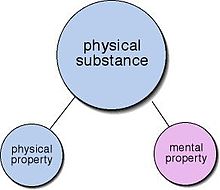This is an old revision of this page, as edited by 188.189.251.64 (talk) at 13:12, 27 March 2024. The present address (URL) is a permanent link to this revision, which may differ significantly from the current revision.
Revision as of 13:12, 27 March 2024 by 188.189.251.64 (talk)(diff) ← Previous revision | Latest revision (diff) | Newer revision → (diff) Category of positions in the philosophy of mind| This article needs additional citations for verification. Please help improve this article by adding citations to reliable sources in this article. Unsourced material may be challenged and removed. Find sources: "Property dualism" – news · newspapers · books · scholar · JSTOR (January 2018) (Learn how and when to remove this message) |

Property dualism describes a category of positions in the philosophy of mind which hold that, although the world is composed of just one kind of substance—the physical kind—there exist two distinct kinds of properties: physical properties and mental properties. In other words, it is the view that at least some non-physical, mental properties (such as thoughts, imagination and memories) exist in, or naturally supervene upon, certain physical substances (namely brains).
Substance dualism, on the other hand, is the view that there exist in the universe two fundamentally different kinds of substance: physical (matter) and non-physical (mind or consciousness), and subsequently also two kinds of properties which inhere in those respective substances. Substance dualism is thus more susceptible to the mind–body problem. Both substance and property dualism are opposed to reductive physicalism.
Epiphenomenalism
Main article: EpiphenomenalismEpiphenomenalism is a doctrine about mental-physical causal relations which holds that one or more mental states and their properties are the by-products (or epiphenomena) of the states of a closed physical system, and are not causally reducible to physical states (do not have any influence on physical states). According to this view, mental properties are as such real constituents of the world, but they are causally impotent; while physical causes give rise to mental properties like sensations, volition, ideas, etc., such mental phenomena themselves cause nothing further - they are causal dead ends.

The position is credited to English biologist Thomas Huxley (Huxley 1874), who analogised mental properties to the whistle on a steam locomotive. The position found a level of favor amongst some scientific behaviorists over the next few decades, which then dove in response to the cognitive revolution in the 1960s.
Epiphenomenal qualia
Main article: Knowledge argumentIn the paper "Epiphenomenal Qualia" and later "What Mary Didn't Know" Frank Jackson made the so-called knowledge argument against physicalism. The thought experiment was originally proposed by Jackson as follows:
Mary is a brilliant scientist who is, for whatever reason, forced to investigate the world from a black and white room via a black and white television monitor. She specializes in the neurophysiology of vision and acquires, let us suppose, all the physical information there is to obtain about what goes on when we see ripe tomatoes, or the sky, and use terms like 'red', 'blue', and so on. She discovers, for example, just which wavelength combinations from the sky stimulate the retina, and exactly how this produces via the central nervous system the contraction of the vocal cords and expulsion of air from the lungs that results in the uttering of the sentence 'The sky is blue'. What will happen when Mary is released from her black and white room or is given a color television monitor? Will she learn anything or not?
Jackson continued:
It seems just obvious that she will learn something about the world and our visual experience of it. But then it is inescapable that her previous knowledge was incomplete. But she had all the physical information. Ergo, there is more to have than that, and physicalism is false.
Panpsychist property dualism
Main article: PanpsychismPanpsychism is the view that all matter has a mental aspect, or, alternatively, all objects have a unified center of experience or point of view. Superficially, it seems to be a form of property dualism, since it regards everything as having both mental and physical properties. However, some panpsychists say that mechanical behaviour is derived from the primitive mentality of atoms and molecules — as are sophisticated mentality and organic behaviour, the difference being attributed to the presence or absence of complex structure in a compound object. So long as the reduction of non-mental properties to mental ones is in place, panpsychism is not strictly a form of property dualism; otherwise it is.
David Chalmers has expressed sympathy for panpsychism (or a modified variant, panprotopsychism) as a possible resolution to the hard problem of consciousness, though he regards the combination problem as an important obstacle for the theory. Other philosophers who have taken interest in the view include Thomas Nagel, Galen Strawson, Timothy Sprigge, William Seager, and Philip Goff.
Other proponents
Saul Kripke
Kripke has a well-known argument for some kind of property dualism. Using the concept of rigid designators, he states that if dualism is logically possible, then it is the case.
Let 'Descartes' be a name, or rigid designator, of a certain person, and let 'B' be a rigid designator of his body. Then if Descartes were indeed identical to B, the supposed identity, being an identity between two rigid designators, would be necessary.
Subjective idealism
Subjective idealism, proposed in the eighteenth century by George Berkeley, is an ontic doctrine that directly opposes materialism or physicalism. It does not admit ontic property dualism, but does admit epistemic property dualism. It is rarely advocated by philosophers nowadays.
See also
- Physicalism
- Functionalism (philosophy of mind)
- Qualia
- "What Is It Like to Be a Bat?"
- Explanatory gap
- Chinese room
Notes
- Churchland 1984, p. 11
- ^ Jackson 1982, p. 130 harvnb error: no target: CITEREFJackson1982 (help)
- Chalmers, David J. (2003). "Consciousness and its Place in Nature" (PDF). In Stich, Stephen P.; Warfield, Ted A. (eds.). The Blackwell Guide to Philosophy of Mind (1st ed.). Malden, MA: Blackwell Publishing Ltd. ISBN 978-0631217756. Archived from the original (PDF) on 3 October 2017. Retrieved 21 January 2018.
- ^ Goff, Philip; Seager, William; Allen-Hermanson, Sean (2017). "Panpsychism". In Zalta, Edward N. (ed.). Stanford Encyclopedia of Philosophy. Retrieved 15 September 2018.
- Strawson, Galen (2006). "Realistic monism: Why physicalism entails panpsychism" (PDF). Journal of Consciousness Studies. 13 (10/11): 3–31. Retrieved 15 September 2018.
- Seager, William (2006). "The Intrinsic Nature Argument for Panpsychism" (PDF). Journal of Consciousness Studies. 13 (10–11): 129–145. Retrieved 7 February 2019.
- Goff, Philip (2017). "The Case for Panpsychism". Philosophy Now. Retrieved 3 October 2018.
References
- Churchland, Paul (1984). Matter and Consciousness.
- Davidson, D. (1970) "Mental Events", in Actions and Events, Oxford: Clarendon Press, 1980
- Huxley, Thomas. (1874) "On the Hypothesis that Animals are Automata, and its History", The Fortnightly Review, n.s. 16, pp. 555–580. Reprinted in Method and Results: Essays by Thomas H. Huxley (New York: D. Appleton and Company, 1898)
- Jackson, F. (1982) "Epiphenomenal Qualia", The Philosophical Quarterly 32: 127-136.
- Kim, Jaegwon. (1993) "Supervenience and Mind", Cambridge: Cambridge University Press.
- MacLaughlin, B. (1992) "The Rise and Fall of British Emergentism", in Beckerman, et al. (eds), Emergence or Reduction?, Berlin: De Gruyter.
- Mill, John Stuart (1843). "System of Logic". London: Longmans, Green, Reader, and Dyer. .
External links
- M. D. Robertson: Dualism vs. Materialism: A Response to Paul Churchland
- Stanford Encyclopedia of Philosophy: Dualism
- Stanford Encyclopedia of Philosophy: Epiphenomenalism
- Stanford Encyclopedia of Philosophy: Physicalism
- The Argument from Physical Minds